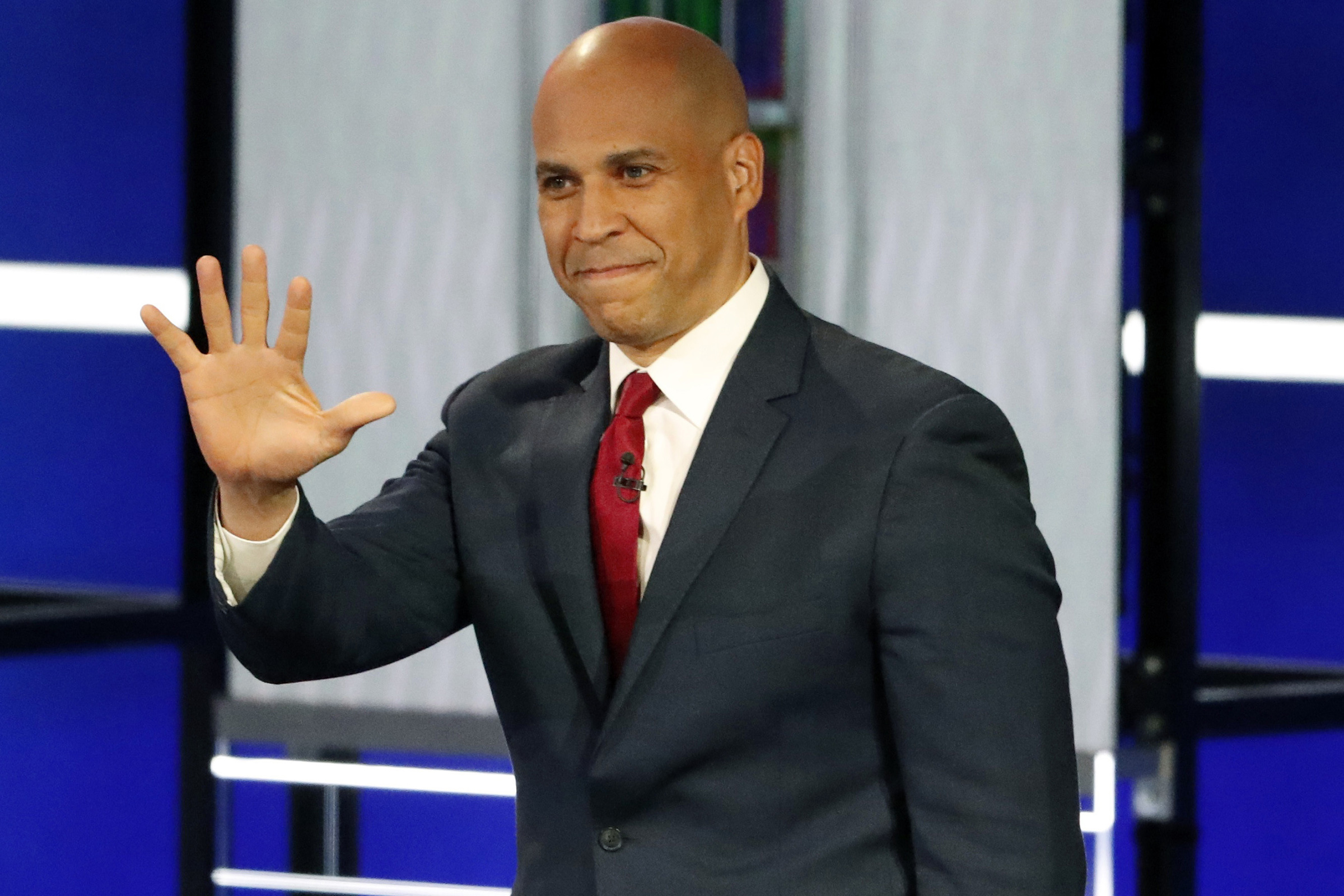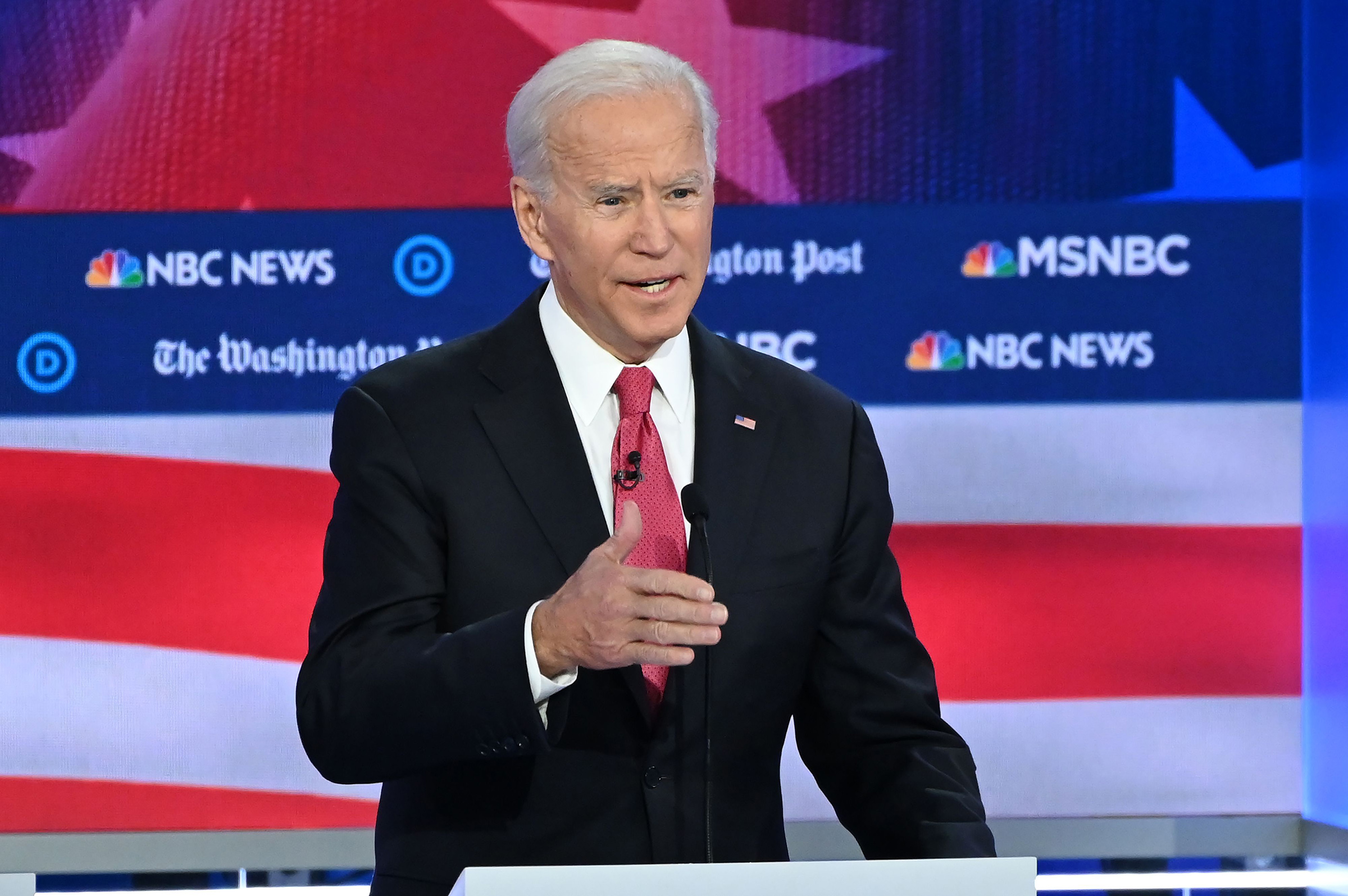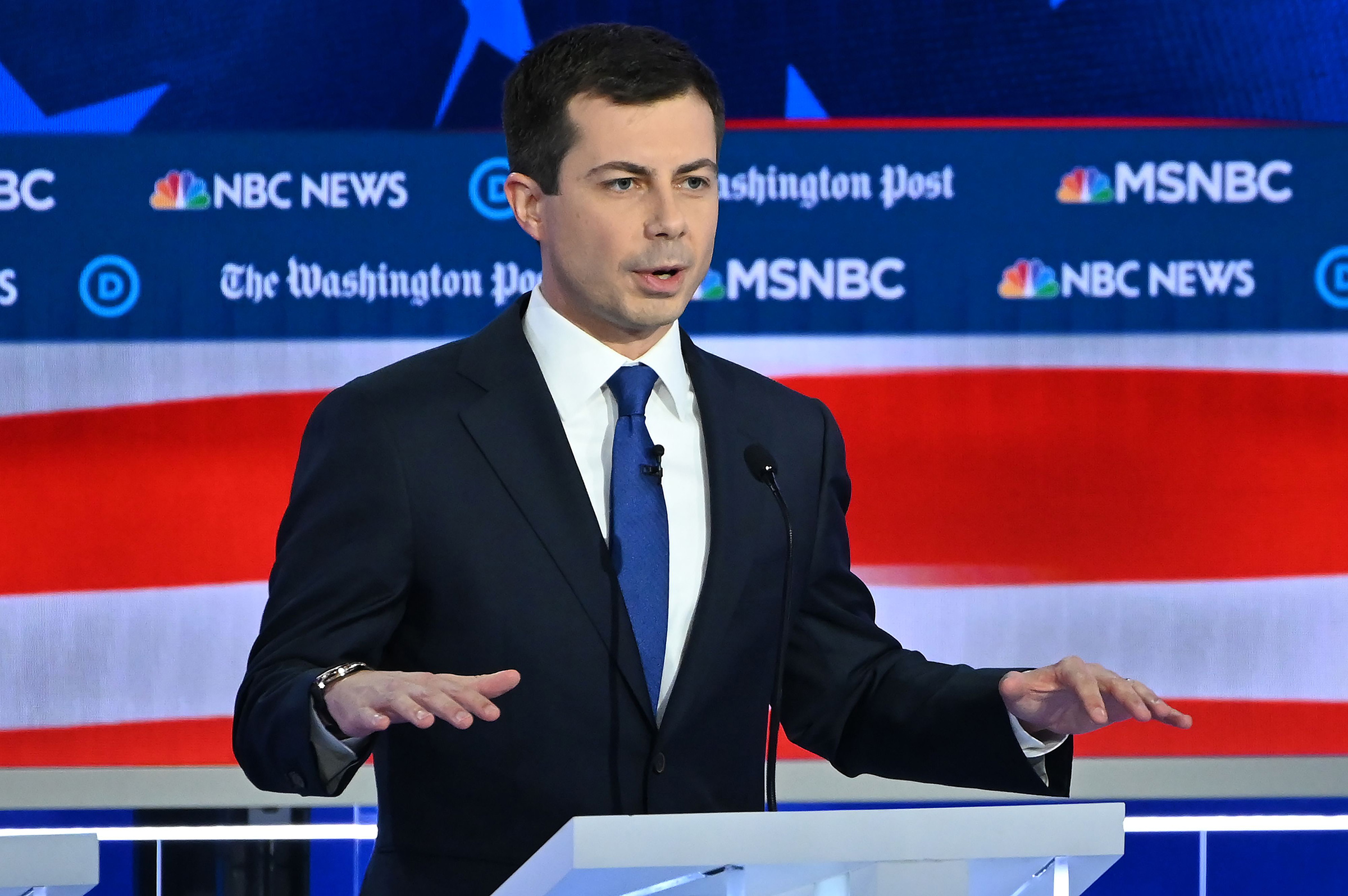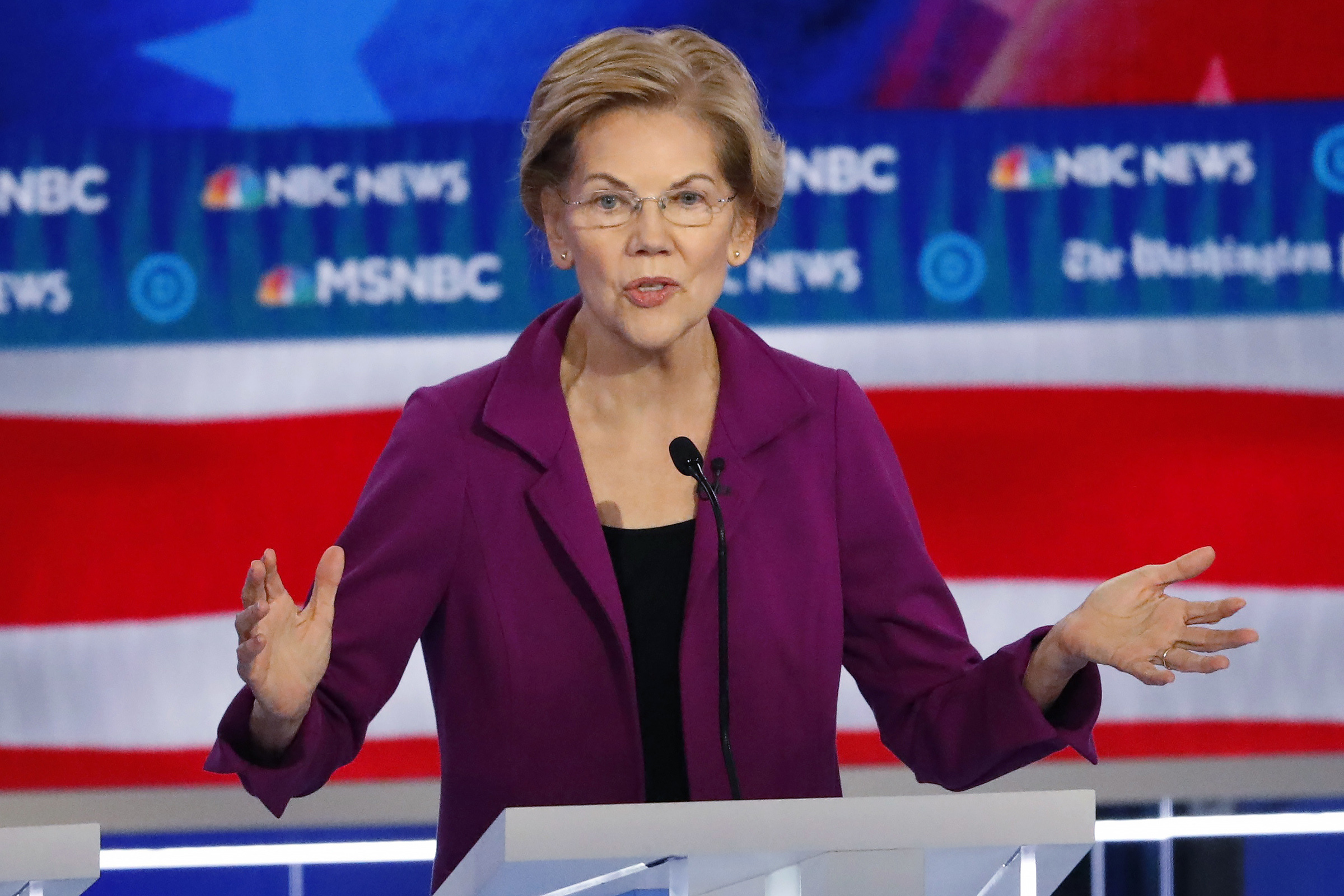For two hours on Wednesday night, America’s regularly-scheduled politics programming switched subjects. Rather than focusing on chaotic impeachment inquiry hearings in Washington, all eyes were on the 10 Democratic candidates who qualified for the November Democratic debate in Atlanta to make their case in a setting that remains ever-important for keeping their campaigns alive.
While the candidates broached topics that have dominated previous debates — such as health care and climate change — the all-women panel of moderators spent more time questioning the contenders about some of America’s other looming policy questions: What would the candidates do about the country’s housing crisis? How would they go about developing paid family leave proposals? In what ways would the competitors combat white supremacism?
Here are TIME’s biggest takeaways from the debate.
Booker embraces the need for a win. And he gets one
New Jersey Sen. Cory Booker had another solid debate performance, and there are early signs that it’s translating into the type of support that will keep him in the primary race. In addition to taking a direct hit at Biden over his recent comments that he would not pursue legalizing marijuana — “I thought you might have been high when you said it” — Booker also touted his credentials, including the fact that he is a Rhodes Scholar which is often overlooked in comparison to South Bend, Ind., Mayor Pete Buttigieg.

Tonight’s commanding performance was typical for Booker, but his campaign has been mired in low polling. “We all owe a debt that we cannot repay. We all drink deeply from wells of freedom and liberty that we did not dig. This is the moment in America where we need a leader that can inspire us to get up and fight again. … If you give me a chance to lead, I will cause what John Lewis says is good trouble. I will challenge us. I will ask more from you than any other president has ever asked before because we need to mobilize a new American movement,” Booker said in a poignant plea to stay in the race as Lewis, a civil rights icon and Democratic member of the House of Representatives who represents an Atlanta district, watched from the audience.
Booker’s deputy campaign manager tweeted that his compelling closing argument was done off-the-cuff, and that he’d raised more than $200,000 in the half hour since he spoke his last words on stage. — Lissandra Villa
Impeachment was an early focus, but not a long one
Moderators wasted no time asking the candidates on stage about the impeachment inquiry; it was the first question out of the gate. Massachusetts Sen. Elizabeth Warren used E.U. Ambassador Gordon Sondland’s testimony earlier in the day to highlight why major donors are problematic and should not be rewarded with Ambassador posts (Sondland had donated $1 million to Trump’s inaugural committee). Former Vice President Joe Biden insinuated that Trump’s desire to have the Ukrainians investigate him in the first place is an indication he is the strongest candidate in the field.
But the candidates did have one unifying theme: no one seemed to want the ongoing probe in Washington to define either their candidacies or the race. “We cannot simply be consumed by Donald Trump,” warned Vermont Sen. Bernie Sanders. “Because if we are, you know what? We’re going to lose the election.” — Alana Abramson
Joe Biden remains flawed — But durable
Former Vice President Joe Biden stumbled through yet another debate, erroneously claiming to have the backing of the only black woman elected to the Senate while sharing the stage with California Sen. Kamala Harris and pledged to fight for women’s right by “punching at it and punching at it and punching.” But the evening is unlikely to destroy his position in the top-tier of Democratic candidates.
Part of the reason Biden has remained so durable despite cringe-inducing moments is that Democrats, more than anything, want someone who can trounce Trump next year. At this point, Biden remains a leading figure on that, in large part because of a deep well of support from older voters and African Americans. The experienced politician, who turned 77 on Wednesday, is widely seen as the best candidate to win back swing states that Trump carried in 2016 — although Harris returned several times to her ability to rebuild what she called the Obama Coalition and Minnesota Sen. Amy Klobuchar talked up her appeal to those swing voters, as well.

At the same time, Biden drew fire from New Jersey Sen. Cory Booker for his comments on marijuana policy and drug laws. Last weekend, Biden said he isn’t ready to legalize marijuana because there are so few medical studies on its long-term effects and said it could be a “gateway” drug to stronger drugs. (Biden says he supports the use of medical marijuana, would decriminalize the possession of marijuana and would allow the states to make decisions about marijuana’s recreational use.) Booker had a clever ding at the ready: “I thought you might have been high when you said it. … Marijuana has already been legal in our country for privileged people.” Biden flashed frustration at the attack and then calmed down. Worse has been said of him, and he’s still enjoying some of the broadest support in the Democratic field — at least for now. — Philip Elliott
Paid family leave gets its moment thanks to all-women panel of moderators
New York Sen. Kirsten Gillibrand dropped out of the Democratic primary in August, but it wasn’t until Wednesday night that one of her flagship proposals — paid family leave — got time on the debate stage. Although the vast majority of Americans support mandatory paid leave for new mothers, the U.S. is the only industrialized nation that doesn’t guarantee paid parental leave through a federal law. One in four women have to return to work within two weeks of delivering a baby, according to a 2015 analysis by non-profit magazine In These Times.
The all-women panel of moderators broached the subject early in their questions. Entrepreneur Andrew Yang used the opportunity to talk about how a positive home life — including whether parents have enough time to spend with their kids — increases children’s success later in life. He suggested requiring employers offer “at least nine months of paid family leave, distributed between parents however they see fit; or six months of paid leave for a single parent.” Minnesota Sen. Amy Klobuchar, whose campaign has largely been defined by pragmatism, suggested a leaner offering. “My plan is three months, I think that’s good,” she said. “I’m not going to go for things just because they sound good on a bumper sticker, and then throw in a free car.”
Though Warren, Sanders and Biden were not offered the opportunity to comment, Warren has advocated for a universal childcare policy with benefits based on a sliding scale and Sanders previously co-sponsored Gillibrand’s Senate bill to provide parents 12 weeks of paid leave. Biden’s campaign has not yet announced a paid family leave solution. — Abby Vesoulis
Buttigieg emerges largely unscathed
Everyone expected South Bend, Ind., Mayor Pete Buttigieg to spend much of his time on the defensive after a week of rising in the polls, but attacks from his competitors were surprisingly mild. Though his rivals have been grumbling about his steady rise, none of them went for the jugular when they criticized him on his failures to reach black voters or his lack of experience. Instead, Sen. Harris said “candidates have taken for granted constituencies that have been the backbone of the Democratic Party,” but declined to attack Buttigieg outright, and Sen. Amy Klobuchar cited her own long experience while briefly criticizing his lack of experience. Buttigieg was able to turn both moments into opportunities.

When Harris alluded to his lack of support among black voters, he said “I completely agree” that his campaign has to do better, and used it as an opportunity to talk about inclusion and belonging. “While I do not have the experience of ever having been discriminated against because of the color of my skin, I do have the experience of sometimes feeling like a stranger in my own country,” he said. And when Klobuchar said “I have actually done the work” in Washington while pointing out his relative lack of experience, he used it as a launchpad to portray himself as a Washington outsider. “Washington experience is not the only experience that matters,” he said. “There’s more than 100 years of Washington experience on this stage, and where are we right now as a country?” Only Hawaii Rep. Tulsi Gabbard tried to land a full punch, when she attacked him for supposedly endorsing military intervention in Mexico, which he quickly and forcefully disputed.
Overall, Buttigieg emerged largely unscathed, partly because his opponents took mostly veiled shots at him and partly because he was able to quickly own up to his shortcomings and use them as a way to tie into broader narratives about his candidacy. — Charlotte Alter
But Harris and Booker highlight the importance of black voter support
While Sen. Harris avoided attacking Buttigieg directly over his campaign’s use of a stock photo of a Kenyan woman for his black outreach plan, she and Booker both used the evening to discuss their party’s outreach to black voters.
“The larger issue is that for too long I think candidates have taken for granted constituencies that have been the backbone of the Democratic party,” said Harris, one of the two black candidates on stage on Wednesday night.
She went on to deride Democrats for only reaching out to black voters when they need their votes. “The question has to be, where you been, and what are you going to do?” Booker also made similar points, noting at one point that “black voters are pissed off” about Democrats not being there for them, pointedly saying Democrats shouldn’t need a focus group to hear from black voters. Booker, earlier in the day, had tweeted about the stock photograph.
While Buttigieg is surging in Iowa and rising in New Hampshire, two early voting states, he has struggled in South Carolina, and with black voter outreach as a whole. In a recent South Carolina poll, he once again polled at 0% among black voters, his campaign has reportedly exaggerated support for his black outreach plan, in addition to the stock photo of a Kenyan woman.
“I welcome the challenge of connecting with black voters in America who don’t … know me,” Buttigieg said at the debate. He pointed to the adversity he has overcome as a gay man and how it helps him relate to other marginalized communities, “making it possible for me to be standing here wearing this wedding ring in a way that couldn’t have happened two election ago lets me know just how deep my obligation is to help those whose rights are on the line every day, even if they are nothing like me in their experience.” — Lissandra Villa
Progressives vs. moderates becomes an undercurrent
The divide between moderates and progressives has shaped a lot of the conversation both in the 2020 Democratic primary and in previous debates, but in Wednesday’s debate that divide was only an undercurrent. That was due in part to the questions asked of the candidates, but also because Warren and Sanders, the two leading progressive candidates, did not make it a priority to put other candidates on the defensive over their lack of support for some of their ideas.
However, it was clear there is still a lot of balking about some of their proposals from moderates. “As I’ve said before, I’d love to staple free diplomas under people’s chairs. I just am not going to go for things … just because they sound good on a bumper sticker and then throw in a free car,” said Sen. Amy Klobuchar alluding to some of the ideas progressives in the field have proposed (like free college). — Lissandra Villa
Candidates differ on dealing with the wealth gap
Candidates sparred over how to address the America’s yawning income gap. The richest 1% of Americans now hold more wealth than the nation’s entire middle class, according to the Brookings Institution. But Massachusetts Sen. Elizabeth Warren and New Jersey Sen. Cory Booker, both self-described capitalists, disagreed over what to do about it.
Warren has pledged to institute an “Ultra-Millionaire” 2% tax on individuals whose net worth is above $50 million and a 6% tax on those above $1 billion. During Wednesday’s debate, Warren argued that the roughly 75,000 households who are rich enough to be affected by her proposed tax didn’t achieve their success alone. “Doing a wealth tax is not about punishing anyone. It’s about saying, ‘You built something great in this country? Good for you,’” the Massachusetts progressive said. “But you did it using workers all of us helped pay to educate. You’re getting your goods on roads and bridges all of us helped pay for. You did it protected by police and firefighters all of us helped pay the salaries for.”
Booker pushed against Warren’s calls to enact a formal wealth tax, arguing instead for other means of increasing tax revenue. “I don’t agree with the wealth tax, the way that Elizabeth Warren puts it, but I agree that we need to raise the estate tax. We need to tax capital gains,” he said. As the Democratic candidates’ platforms have shifted left, Booker may be trying to appeal to fellow capitalists who worry about the multi-trillion dollar plans — like free four-year college and erasing student debt nationwide — proposed by candidates like Warren and Sanders.
Arguing that Americans should have both fair wages and equal opportunities to earn those wages could help Booker pick up some much-needed support from undecided and moderate Democrats as his campaign struggles to exceed 2-3% in national polls. “The people in communities I frequent, [their] aspiration is not just to have those fair wages. They want to have an economy that provides not just equalities in wealth, but they want to have equalities in opportunity,” Booker said. “And that’s what our party has to be about.” — Abby Vesoulis

Pivot to climate change
While the moderators devoted little time to climate change with only a couple of questions on the issue, candidates pivoted to the issue anyway — an indication that candidates not only recognize the issue’s urgency but also that their campaigns view the issue as winner with voters.
Asked about military service, Warren talked about Americans serving their country by working on public lands to fight climate change. Asked about farm subsidies, Buttigieg talked about making climate-sensitive farms “as big a symbol of dealing with climate change as the electric car.” And Sanders managed to slip in a reference to climate change in response to a question about impeachment.
There’s good reason for this pivot beyond the urgency of the challenge: voters care about climate. A Quinnipiac poll released earlier this month that show climate change running neck and neck with the health care as the top issue in New Hampshire. And many earlier polls show the issue in a similar place in Iowa. — Justin Worland
No Castro or O’Rourke meant less time on immigration and gun violence
While the debate allowed candidates to talk about a wider range of topics than in the past, many viewers noted that the absence of former Texas Rep. Beto O’Rourke and former HUD Secretary Julián Castro highlighted a lack of discussion around some issues such as gun violence, immigration and how violence can affect people of color.
O’Rourke dropped out of the 2020 race earlier this month and while Castro is still running for President, he did not meet the polling requirement to participate in this month’s debate, and has been struggling to raise funds despite continuing to put out progressive policy ideas. Castro drew attention on the debate stage back in June when he challenged his fellow Democrats to decriminalize illegal immigration, and has earned support from activists for speaking out about police violence, as well as advocating for reproductive justice and for disability rights. O’Rourke, who is from El Paso, Texas, which saw a mass shooting in August, made gun control a focus of his campaign and stirred controversy when he proposed a mandatory buy back of assault weapons.
Despite not being on the debate stage, Castro spent his evening tweeting along, and some of his supporters noted that his ideas were now being taken up by other candidates, such as when Elizabeth Warren said she believed abortion rights “are economic rights.” But others such as Rep. Pramila Jayapal lamented that no one took up the immigration mantle in Castro’s absence, and Warren herself said “we should have talked about gun violence” in her closing statement, something that O’Rourke would have no doubt agreed with. — Abigail Abrams
More Must-Reads from TIME
- Caitlin Clark Is TIME's 2024 Athlete of the Year
- Where Trump 2.0 Will Differ From 1.0
- Is Intermittent Fasting Good or Bad for You?
- The 100 Must-Read Books of 2024
- Column: If Optimism Feels Ridiculous Now, Try Hope
- The Future of Climate Action Is Trade Policy
- FX’s Say Nothing Is the Must-Watch Political Thriller of 2024
- Merle Bombardieri Is Helping People Make the Baby Decision
Contact us at letters@time.com
